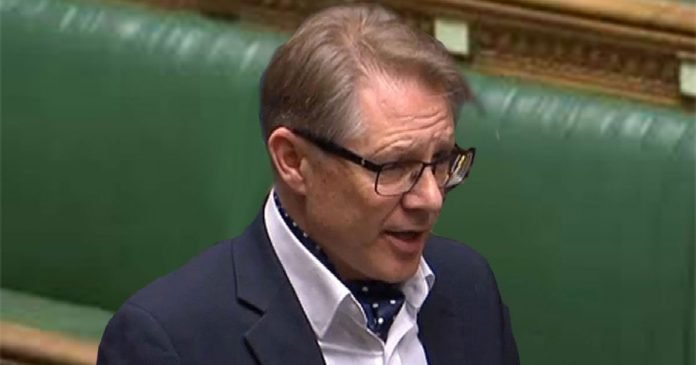A Conservative MP has been ordered to apologise to the Commons after he breached parliamentary rules on paid advocacy.
David Morris last year asked a question and sent a follow-up email to the Business Secretary relating to a firm which had given him a £10,000 donation the previous month.
David Morris, a backbench MP since 2010, was given the money by Aquind Ltd in September and a month later he asked the government to lobby Ofgem to make regulations which would benefit the company, in an apparent breach of lobbying rules. Aquind is seeking to build a £1.1 billion electricity cable linking the UK and France.
The guide to the members’ code of conduct says MPs must not “Taking payment in return for advocating a particular matter in the House is strictly forbidden. Members may not speak in the House, vote, or initiate parliamentary proceedings for payment in cash or kind. Nor may they make approaches to Ministers, other Members or public officials in return for such payment.”
An inquiry by the Committee on Standards ruled that Mr Morris had inadvertently breached the Code of Conduct for MPs on two occasions.
The report by the parliamentary commissioner for standards, Kathryn Stone, also criticised the Morecambe and Lunesdale MP’s conduct during the inquiry.
She said: “I consider Mr Morris’s conduct during my inquiry to be regrettable and disrespectful of the House’s system of standards.
“Mr Morris has now acknowledged and apologised for his breach of the rules and for his conduct during my inquiry. I have also accepted that his breach of the rules was inadvertent.”
The committee recommended that Mr Morris apologise to the Commons by means of a personal statement.

It’s not the first time Morris has found himself on the whip end of politics
In 2013, Morris’ expenses attracted media attention after it was revealed that he had the second highest parliamentary expenses claim in the country. Criticised by his political rivals, he responded to his local newspaper that: “I am frankly insulted by the line of questioning your journalist has decided to take…My expenses are independently adjudicated by IPSA and are only paid for legitimate items.
Morris was at the centre of an expenses row after he claimed £1,400 for constituency expenses when he was away on a foreign trip
Morris had claimed £1,400 for driving trips while he was away on a foreign trip.
Davis Morris claimed for 25 trips covering over 4,000 miles, which included journeys between Westminster and his constituency in Morecambe, records show.
Morris has also received attention for the number of overseas trips he has received as an MP. In October 2018, it was detailed that his free trips overseas in the previous year were worth £17,994 in total and were the third highest value of any MP’s trips during the year following the 2017 general election.
In August 2017, Morris was accused of nepotism by the publication Private Eye after it was revealed that he employed his partner as his Senior Parliamentary Assistant on a salary up to £45,000. Morris argued that this was not nepotism as he had employed Emma Smith since 2010, which was before their relationship began. Although MPs who were first elected in 2017 have been banned from employing family members, the restriction is not retrospective – meaning that Morris’ employment of his partner is lawful.
The restrictions do, though, state that staff members who begin a relationship with an MP while working for them will have their publicly funded contract terminated after two years as a partner.
Probe into Conservatives’ 2015 election expenses.
In 2017 an investigation into a Conservative MP’s general election expenses claims was been dropped, police said.
David Morris was one of 24 MPs named in a national newspaper investigation into money spent on a campaign Battlebus during the 2015 election.
It was alleged the Morecambe and Lunesdale MP had broken election laws – but he said procedures had been correctly followed by Conservative HQ.
Lancashire Police said it would be taking no further action.
The “cash-for-questions affair” was a political scandal of the 1990s in the United Kingdom.
MPs are prohibited from lobbying for financial or material benefit for a person or organisation from whom they have received a donation in the previous six months.
Cash for Questions
The 1990s and John Major’s government became tarnished with allegation and incidents of ‘sleaze’. One of these happened in 1994 when it became clear that some people within the Conservative party had agreed to put questions to Parliament in exchange for money.
This became known as the ‘Cash for Questions’ scandal and really damaged the Prime Minister and reputation of the Conservative Party who set up a Committee on Standards in Public Life to look at the declining standards of parliament and people in public life.
Two Conservative Members of Parliament, Neil Hamilton and Tim Smith, were accused by the Guardian Newspaper of taking money and accepting gifts (such as a stay in the Ritz) from Mohamed Al Fayed (then owner of Harrods), to make sure they asked certain questions in the House of Commons. It was said that Mr Ian Greer, a lobbyist, was their ‘middle-man’ shuttling the money and instructions between them.
When the allegations became public, Tim Smith admitted to the cash and immediately resigned. Neil Hamilton said he was innocent. Hamilton was forced to resign as a minister of the government as charges had been brought against him (standard for ministers) and then he lost his parliamentary seat in 1997 to an independent candidate Martin Bell (news journalist) who stood against him with an anti-sleaze message.
Hamilton and the lobbyist, Ian Greer took out libel writs, claiming what was written were lies, against the Guardian, but eventually dropped their action. Mr Hamilton also sued Mr Al Fayed for libel, but he lost.
Hamilton and his wife, Christine became media celebrities and have since appeared on a number of reality TV programs. Neil became active within the UK Independence Party (UKIP), although a fractious relationship from the start, appearing as a spokesperson on programs such as BBC Question Time.
Morris made a clear breach of the rules
The report said Mr Morris made a “brief declaration of a relevant interest” in his email to the Business Secretary but it “did not meet the requirements of the rules”.
Mr Morris asked a topical question on October 22 2019 in which he asked Ofgem to make regulations to “protect” companies such as Aquind through a regulatory regime.
He had accepted a £10,000 donation from the energy firm the previous month.
Ms Stone concluded that this question “sought to confer a financial or material benefit on the company”.
The next day, Mr Morris emailed the Business Secretary with additional questions. The commissioner found this also breached the paid advocacy rule.
Support Independent Journalism Today
Our unwavering dedication is to provide you with unbiased news, diverse perspectives, and insightful opinions. We're on a mission to ensure that those in positions of power are held accountable for their actions, but we can't do it alone. Labour Heartlands is primarily funded by me, Paul Knaggs, and by the generous contributions of readers like you. Your donations keep us going and help us uphold the principles of independent journalism. Join us in our quest for truth, transparency, and accountability – donate today and be a part of our mission!
Like everyone else, we're facing challenges, and we need your help to stay online and continue providing crucial journalism. Every contribution, no matter how small, goes a long way in helping us thrive. By becoming one of our donors, you become a vital part of our mission to uncover the truth and uphold the values of democracy.
While we maintain our independence from political affiliations, we stand united against corruption, injustice, and the erosion of free speech, truth, and democracy. We believe in the power of accurate information in a democracy, and we consider facts non-negotiable.
Your support, no matter the amount, can make a significant impact. Together, we can make a difference and continue our journey toward a more informed and just society.
Thank you for supporting Labour Heartlands












